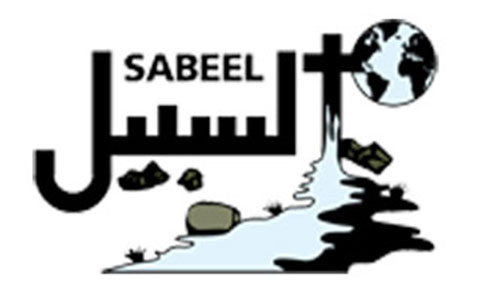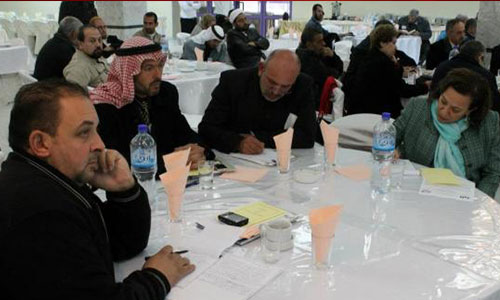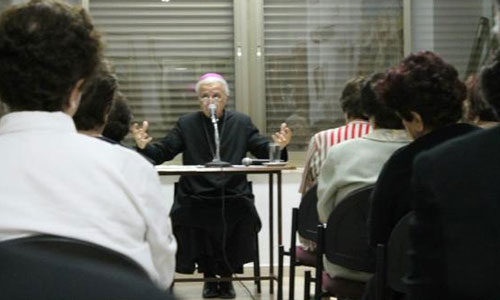
Category: Latest News
رسالة الميلاد 2012

طفل في مذود – التحرر واللاعنف – لقراءة الرسالة الرجاء الضغط هنا
Sabeel Christmas Message 2012

A Child in a Manger: Liberation through Nonviolence
Sabeel Christmas Message 2012
“This will be a sign for you: you will find a child wrapped in bands of cloth and lying in a manger.” Luke 2:12
“For to this end we toil and struggle, because we have our hope set on the living God, who is the Savior [liberator] of all people, especially of those who believe.” 1Tim. 4:10
This is not the first time that Christmas comes and our area of the Middle East is entangled in severe political and military turmoil. Sabeel’s Christmas letter, therefore, starts with our prayers and thoughts focused on the plight of our brothers and sisters in Palestine-Israel, especially the Gaza Strip, as well as in Syria, Egypt, Lebanon, Jordan and throughout our region.
Recently in Palestine-Israel, we have been trapped yet again in a war where the brunt of the violence is borne by the common people, especially the women and children. Indeed, since the creation of the state of Israel almost 65 years ago, peace has eluded us and our area has enjoyed only a modicum of stability and security. By and large, political leaders seem to believe that war is the great resolver of conflicts, yet our many wars have only exacerbated the conflict and brought us greater misery.
In reflecting on the Christmas story, what stands out to me this year are the words of the angel to the shepherds, “This will be a sign for you: you will find a child wrapped in bands of cloth and lying in a manger.” The people of first century Palestine were looking for salvation and liberation from the oppressive yoke of the Roman Empire. They were looking for a military leader to overthrow their oppressors and lead them to victory. The angel, however, declared that their savior had come in the form of a helpless child. Today’s Palestinians are looking for salvation and liberation from the oppressive yoke of Israel. Tragically, and too often, it is through the clamor of the instruments of war and violence that we seek our liberation. Yet true and lasting liberation can only come through the power of nonviolence.
Ironically, Israel prefers to keep entrenching its occupation, expanding its illegal settlements, and devouring Palestinian land, rather than pursue a genuine peace with the Palestinians on the basis of UN Resolutions and International Law. Those of us who live in the present hopeless morass know that the government of Israel is not ready for such a peace. In fact, for those who have eyes to see, the recent UN bid clarifies the situation well. The overwhelming number of countries that voted yes for Palestine as an observer non-member state could no longer tolerate the intransigence of the government of Israel (138 voted for; 41 abstained; 9 voted against). This is unprecedented in the history of the Palestinian struggle. This may be a sign of the advent of peace for all the people of our region – peace that is not based on the arrogance of military power but on the power of justice through nonviolence.
Sadly, Israel is intoxicated by its military prowess, causing it to live in a state of denial concerning the movement of history. It is important to read the signs of the times. Martin Luther King once said, “The arc of the moral universe is long, but it bends toward justice.” The light of truth is beginning to shine, and it will dispel the darkness that has spread regarding Palestine.
In light of this, Sabeel will not lose hope but will renew its commitment to champion the achievement of a just peace through nonviolence. With the writer of the letter to Timothy, Sabeel says, “For to this end we toil and struggle, because we have our hope set on the living God, who is the Savior [liberator] of all people, especially of those who believe.”
At this crucial time, let us – Palestinians, Israelis, and friends around the globe who believe in the power of justice and nonviolence – work together to end all violence and acts of war. Let us call for an empowered UN that can assume its historic responsibility, address the root causes of the conflict over Palestine, end the Israeli occupation of Palestinian land, and implement UN resolutions, thus guaranteeing the human and political rights of the Palestinians. Only then will all the peoples of the land enjoy a shared life of peace and security in Palestine and Israel. The world must remember that the Palestinians, at this juncture in their history, yearn to fulfill their most fundamental human needs of justice, dignity, and liberty. This is a pursuit so basic that the hope and struggle for it will never die.
The angel said, “This will be a sign for you: you will find a child wrapped in bands of cloth and lying in a manger.” Through nonviolence and solidarity among Palestinians, Israeli Jews, and friends around the world, and with the help of God, peace and security based on justice will be achieved.
May the hope and peace of Christmas remain with us throughout the coming New Year!
Naim Ateek
Director
7 December 2012
Sabeel Women’s Visit to the Four Homes of Mercy

Twenty members of the Sabeel Women’s Programs went to visit the Four Homes of Mercy in Bethany located just southeast of Jerusalem on the Mount of Olives.
The Four Homes of Mercy was established in 1940 by Mrs. Katherine George Siksek, a Palestinian Christian. It serves people with special needs, especially those suffering from severe physical and/or neurological disorders. Four Homes of Mercy provides them with specialized rehabilitation services (physical, occupational, and recreational therapy) and a loving home. The Four Homes is unique its ability to respond to the needs of residents by providing them with the resources they need to maximize their abilities. For most of the residents, the Homes is truly their home; some have lived there for decades. During their visit, Sabeel groups spent time in all the departments of Four Homes, giving presents to all the residents and singing Christmas songs with them.
Afterwards, Bishop Melatheos Bassal invited them into the Church of the Four Homes, prayed with the group, and gave a short sermon on Advent. The Bishop spoke about the unexpected form by which the Savior came to us and about the Gospel’s startling call on our lives. In the Old Testament, people were anxiously awaiting a savior king, not Jesus of Nazareth, a baby born in a barn and laid in a manger. Jesus was arrested and sentenced to scourging and death on a cross – a series of events that hardly matched up to what the world was expecting in a savior. Yet Jesus’ crucifixion – indeed redemptive suffering in general – are central aspects of Christian theology. So we see that Jesus’ first coming gave to all people repentance, hope and joy. But as we await the second coming of Christ, we must ask ourselves if we are ready to receive him. Luke 3:11 commands that “He who has two coats, let him impart to him that has none; and he who has meat, let him do likewise.” Receiving Jesus means that we must also receive his clear message to help others in need. Bishop Bassal ended his session by asking if we are ready to receive this calling from Jesus.
To close the visit, the General Director of the Four Homes of Mercy gave a brief history of the place up until current day, including their existing programs and their immediate needs for human resources and funding. The Homes hosted the guests for some tasty treats and thanked the group for coming.
Follow-Up Interfaith Study Day on School Curricula in Palestine

Thursday, 6 December 2012
Bethlehem Hotel – Bethlehem
As a much desired follow-up event to a previous Study Day, Sabeel and Al-Liqa’ Centers recently organized a second Study Day led by educators, religious leaders, and academics that gathered more than 120 people from all walks of life. As recommended at the previous Study Day, several important community leaders were also present: the Mufti of Bethlehem, Sheikh ‘Abd Al-Majeed ‘Ata; Director of Education in the Bethlehem Governorate, Mr. Sami Mrowa; and a representative of the Military Commander of the Bethlehem Governorate, Mr. Adnan Al-Nayef.
Mrs. Sawsan Bitar, coordinator of Shared Living Programs at Sabeel, welcomed everyone participating in the study day and introduced the speakers.
The first session was a panel discussion between Dr. Geries S. Khoury and Fr. Dr. Faysal Hijazin, moderated by Mr. Mousa Darwish of Al-Liqa’.
Dr. Khoury primarily emphasized the vital role of educational curricula in building strong ties of shared community life and mutual understanding. He articulated the dire need to revise Palestinian curricula especially in the subjects of religious and civic history as well as Arabic language. These revisions must ensure that Christian contributions to Arab society throughout history are equally discussed and presented in the textbooks – a change that would help instill in youth the importance of shared living and a full and equal citizenship for every member of society.
The second panelist, Fr. Dr. Faysal Hijazin, described a meeting held between him and three others: Dr. Jihad Zakarneh, the Deputy Secretary of the Ministry of Education; Mr. ‘Omar ‘Anbar, the Director of General Education; and Mr. Muhannad ‘Aabed, who oversees the private schools. In this meeting, Fr. Hijazin put forth the need to develop the curricula in such a way as to be attuned with Palestinian reality. Christian presence in Palestine is a basic element in history and society. Fr. Hijazin warned that anyone who attempts to negate this fact of religious, cultural, and political pluralism undermines society. The Ministry of Education welcomed Fr. Hijazin’s suggestions at the meeting and accepted the booklet “History: The Teacher of Life” which points out historical errors concerning Palestinian Christians that have gone unnoticed in the curricula. Dr. Zakarneh affirmed the need to revise the curricula, comparing Palestinian society to a rainbow in which Christians and Muslims are both integral parts. Dr. Zakarneh stated firmly that no one wants to undermine the positive, active role of Christians in history.
The second panel was moderated by a friend of Al-Liqa’, Mr. Younis Jaddou’, and included Mrs. Haifa Baramki from Birzeit University, Sheikh Zuheir Al-Dab’i of Nablus, and Pastor Ibrahim Nairouz from Rafidia / Nablus.
Mrs. Baramki spoke first, focusing on the importance of religious discourse and the ways in which schoolbooks can be optimally utilized to further the cause of Shared Living. First and foremost, such religious discourse must begin with respect for the dignity and humanity of the other, revealing the religion of each with reverence in order to build a dialogue of love and understanding. Mrs. Baramki stressed the need to introduce the subject of “ethics” in the Palestinian Curricula in order to ensure students receive an education based on openness, respect and balance.
Sheikh Zuheir Al-Dab’i also focused on the importance of a tolerant religious discourse, which would unite rather than divide, even in the face of difference. He stressed the role of religious discourse in strengthening national unity and in undermining hatred and violence.
Pastor Ibrahim Nairouz then spoke about harmony in society and the need to select and train preachers in mosques and churches to preach messages about the importance of loving and respecting others. These public places of worship must also share in the responsibility to contribute to a culture of shared living and national unity.
At the conclusion of the conference, the following recommendations were agreed upon:
• The Palestinian curricula must fully represent the narratives, beliefs, and principles of all people in the land so that their shared geography and history can contribute to building better community understanding. Civic education curricula as well as Islamic and Christian religion curricula must introduce and systematically incorporate Shared Living culture.
• Teachers in the Palestinian education system must be fully qualified to properly teach a culture of shared living and shared national identity.
• Schools must teach students how to solve problems through balanced, respectful dialogue with all concerned; fanaticism must be completely eradicated.
• The whole enterprise of religious discourse and all its teaching methodology must be utilized to further the cause of teaching human dignity and respect for difference. The religious sphere should not hesitate to communicate this message through technology as well, since this is one of the most prevalent forms of mass communication today.
• The school curricula must be a fundamental tool in the construction of a healthy, shared national identity at every level – whether local, national, or relating to all humankind.
Open Forum: “Advent Preparation”

Bishop Atallah Hanna
13 November 2012
Advent is a time traditionally given to reflection on the mystery of the incarnation, of God-with-us in the person of Jesus Christ. In preparation for this unique season, Sabeel hosted an Open Forum to discuss how Advent relates to the Christians of Palestine.
Samia Khoury opened the evening by welcoming the guests and introducing the speaker, Bishop Atallah Hanna, Archbishop of Sebastia, Orthodox Patriarchate of Jerusalem. Mr. Nabeel Al-Masou followed her by beginning the session with an Advent carol from the Orthodox tradition.
Bishop Hanna focused on themes of faith and hope. He said that Advent is a reminder of how we must not give in to discouragement, despite the painful and distressing things we see in life. For through faith, we receive the daily hope of Christ in our lives. While we commemorate the official Advent season but once a year, the advent of Jesus’ presence in our lives is an on-going reality. Nowadays, many nations celebrate Christmas by exchanging gifts, food, and drinks, but forget Christ as master of the feast and host of the celebration. Bishop Hanna urged all Christians to pray together, remembering Jesus at all times and making our hearts “like mangers” where the Advent of Jesus occurs continuously in our lives.
Later, Bishop Hanna also posed the question: “Why was Jesus born?” Jesus was born and lived as a human being to show God’s mercy and love towards us. When King Herod heard about Jesus’ birth, he was furious about it. He gave orders to kill all baby boys age two and under in Bethlehem and its vicinity, in order to assure baby Jesus was killed. Fortunately, Herod was not able to eliminate the message of Jesus about love and forgiveness.
Bishop Hanna concluded by offering the meaning of Christmas and the Advent of Christ as humanity’s invitation to follow the way of peace, justice, and nonviolence.
Following the presentation there was time for questions and answers, after which the session ended with another Advent carol.
Women’s Visit to Nabi Saleh

Sabeel Women’s Visit to the Women’s Centre for Legal Aid &
Counseling (WCLAC) in Ramallah & the Village of Nabi Saleh
8 November 2012
On November 8, some Women of Sabeel went to learn about the work of WCLAC. The centre, established in 1991, is an independent Palestinian non-governmental organization that seeks to assist in the development of a democratic Palestinian society based on principles of equality and social justice between men and women. WCLAC has played a prominent role in addressing gender-based violence in Palestinian society in both private and public spheres.
Upon the women’s arrival, Mrs. Salwa Duaibis, Director of WCLAC’s Documentation and Advocacy Unit welcomed them and spoke about her role in advocacy. She described some of the challenges faced by Palestinians living under occupation as seen through the eyes of ordinary women – ordinary women struggling to cope with an extraordinary situation. She shared with the participants the story of a 21-year-old Christian Palestinian woman from Jerusalem, explaining how the woman’s freedom of movement and right to practice her religion have been restricted by Israeli government policies.
Mrs. Rawan Obeid, WCLAC staff, shared some background with the women on Civil Status Law for Christians and Muslims, Inheritance Law, and Penal Laws throughout the last ten years, after which she explained how the Centre’s legal and social services address related needs. She gave an overview of the different kinds of cases that WCLAC receives and the procedures taken for each. Explaining the importance of documenting each case, she presented one of the success stories as an example. A vibrant discussion followed, as participants were asked to share some of their personal experiences.
The women then watched the film “Gandhi,” which follows the life of Ghandi from 1898 to 1947, also examining the political history and struggles of late colonial India. This film is a powerful tribute to the effectiveness of non-violent resistance, especially when many people unite together to accomplish it.
Later, the Sabeel group visited a Palestinian family in the village of Nabi Saleh, located about 20 kilometers northwest of Ramallah. Nabi Saleh’s residents have hosted weekly demonstrations for the past three years, protesting the confiscation of the village’s lands and the illegal takeover of their spring by Halamish, the nearby Israeli settlement. One of the family members told the women that there are regular clashes with the Israeli Army during the protests, as the Israeli Army attempts to disperse crowds with teargas, skunk water, rubber bullets, and sound grenades. Having listened to the family’s story, the women ate lunch together with the family before heading back to Jerusalem.
Ecumenical Prayer Service for Gaza

In response to the great wave of violence Gaza suffered in the attack of November 2012, Sabeel acted quickly to organize a special ecumenical and interfaith prayer service to show our solidarity with those in Gaza. On November 20, 140 Christians, Muslims, and Internationals gathered at the Dominican Church in Jerusalem, including representatives of all the heads of the churches as well as the governor of Jerusalem, Adnan Husseini.
The service began with a moment of silence for the victims of the attack on Gaza, followed by opening prayers by Latin Patriarch Emeritus Michel Sabbah and Archbishop Atallah Hanna of the Greek Orthodox Church. Fr. Jamal Khader gave a powerful homily in Arabic, and he focused those present on the reason for the service:
“Our prayers today are focused on our brothers and sisters in the Gaza strip: for all the people who are suffering, injured, martyred, for those whose houses have been destroyed, for everyone suffering in this unjust war. These prayers are not a shelter for the people who have no power, but they are a cry to God in a time when the world is not listening to the voice of the oppressed.”
Fr. Jamal spoke of Cain and Abel, lamenting how the voice of a brother’s blood still cries out to God from the ground (Gen 4:10). Still, we trust God, and we trust Jesus that he will listen to our cry. Fr. Jamal reminded the gathering, “Ask, and it will be given to you; seek, and you will find; knock, and it will be opened to you” (Matt. 7:7). The prayers of faithful people are not separate from their lives and commitments; prayer reminds us of our own duty to “model our lives after the life of Christ,” revolting against oppression and hate and standing with the poor and the hurt. In readying ourselves to contribute to relieving our brothers’ and sisters’ pain, like Jesus did, we “launch” from praying to becoming the instruments of God’s peace.
Sabeel invited Fr. Simon Herro to lead the gathering in general prayers for peace and specific prayers for our brothers and sisters in Gaza. The prayers were prayed in Arabic, English, and French, by both Muslims and Christians. The Al-Raja Jerusalemite band wrote and performed a special song for Gaza, and led the group in a number of hymns as the gathering ended with the congregational lighting of candles and the singing of “Yarabba Ssalami,” which in English means, “God of peace, grant us peace.”
Open Forum

“The Year of Faith”
Bishop William Shomali
23 October 2012
Samia Khoury welcomed the guests and began the Open Forum by introducing Bishop William Shomali as the key speaker for the session.
This year, the theme of the Catholic Diocese is “Faith,” thus the evening focused on determining the nature of this central theological virtue. Bishop Shomali first gave three examples from the Gospels of people who showed great faith. He then explored the relationship between faith and reason.
The first example was taken from Luke 18:39-43 where a blind man shouts out to Jesus, unhindered by those who rebuked him and asking fervently to receive his sight. In reference to this passage, Bishop Shomali said that communication with God can happen through faith. He defined Faith as vision, belief, and an act.
The second example came from Luke 19:8 about Zachaeus’s response to meeting Jesus. Seeing how Zachaeus committed to “give half of his possessions to the poor” and pay back anyone he had cheated, four times over, Bishop Shomali discussed how Faith means reconciliation between people.
The third example of Faith came from the story of the Canaanite woman in Mattew 15:21-26, in which, after a striking conversation about who is worthy of healing, Jesus heals her daughter from demon-possession.
Finally Bishop Shomali addressed the relationship between faith and reason. Faith enlightens the mind so that human beings can see deeper and further, and be more able to consider things through God’s perspective which is a tremendous power. Faith can be strengthened through miracles and reading the Bible.
After the presentation there was time for questions, answers, and discussion.
Ecumenical Prayer Service

Sabeel cordially invites you to an
Ecumenical Prayer Service
Join us in lifting up Prayers for our people in Gaza
For the current situation of bloodshed
& Human Rights violations
Sermon: Father Jamal Khader
Tuesday, 20th of November 2012 – 05:30 pm
Dominican Church on Nablus Road
(Across from the Jerusalem Hotel)
Everyone is welcome!
Most of the service will be conducted in Arabic
with key parts translated into English
Sabeel Ecumenical Liberation Theology Center
Phone: 02-5327136 – sabeel@sabeel.org


